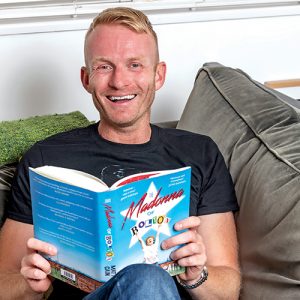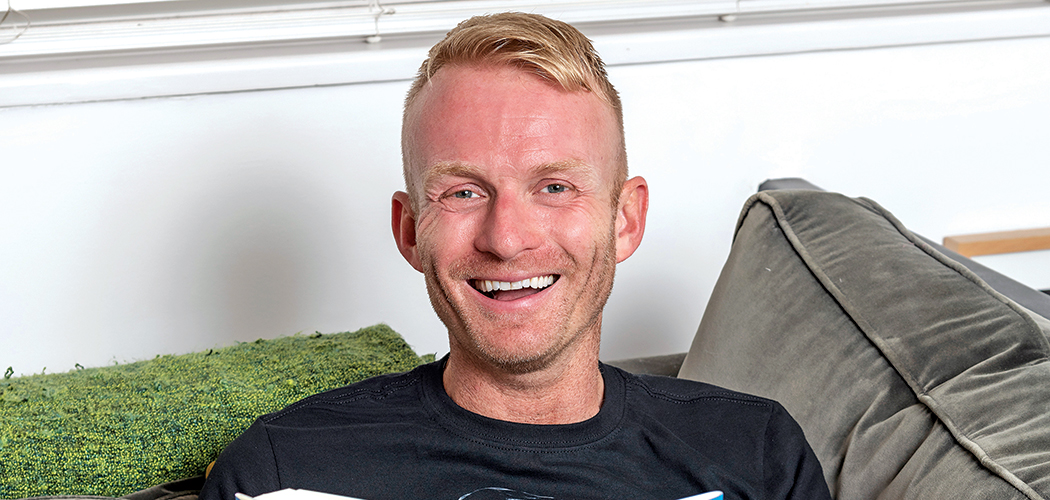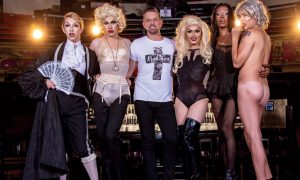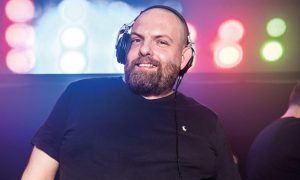Matt Cain is the former editor-in-chief at Attitude magazine. His fantastic new novel The Madonna of Bolton is the book mainstream publishers said was too gay to publish. Think “Billy Elliot meets Beautiful Thing wearing a conical bra”. It’s a joyous, touching, hilarious and hugely entertaining, and poised to be the gay novel of the summer. It opens with young Charlie Matthews growing up in suburban Bolton discovering Madonna on his 9th birthday, and his life changing forever. With Madonna’s 60th birthday celebrations coming up next month, Uli Lenart from Gay’s The Word bookshop met up with Matt to ask him about the novel and what the queen of pop means to him.

Matt, huge congratulations on the novel. It feels like you really poured your heart and soul into this book…
Thank you. Yes I did, more than anything else I’ve ever written. I’ve done a few novels before, I’ve done a lot of personal journalism, but this, more than anything else, I put everything into it and therefore I care about it more. I hope readers connect with it and engage with it.
The story of how this book got published is an interesting one, tell us about it.
Well I wrote the first draft – I started it in 2006, so that’s 12 years ago – and then in three runs of submissions over 10 years I got over 30 rejections from publishers. Over the years I noticed that what they were saying was “it’s too niche, it’s not commercial enough, it won’t connect with a mainstream readership”, and when these publishers were pressed on the reasons why they thought this they’d always mention the fact that the lead character is gay. I don’t think that this is a barrier to engagement for mainstream readers. I think it may have been in 2006, funnily enough, but I don’t think it is in 2018. That’s why I wanted to prove them wrong. That’s why when I was Editor-in-Chief at Attitude magazine I did crowd-funding campaign on social media to raise the money to publish it through the crowd-funding publisher Unbound. It was such a successful campaign that we broke the record for crowd-funding novels. The average is about three months and we did it in seven days. We got pledges from countries all over the world, including places like Sri Lanka, and Saudi Arabia, where it is still illegal to be gay. Madonna fan forums everywhere went wild. And I think we conclusively proved that there is a market for this book.
How autobiographical is the book? Where does Charlie Matthews end and Matt Cain begin?
Well, I’ve never told anybody this, but his first name was my grandad’s name and his surname was my grandma’s maiden surname. So already I’m inviting people to look at it autobiographically. The skeleton of the story, what happens to the character, is very much inspired by my own life, as is the impact of Madonna’s music and videos and tours made on this boy when he was growing up. And the reasons why he was having such a tough time, they are also autobiographical. But I think it would be a mistake to read it as too autobiographical. The mother and father characters are very different to my mum and dad, I have an older sister and a younger brother, rather than one older brother, but the feelings Charlie experiences are true to what happened to me.
Tell us about the young Charlie. The book opens on his 9th birthday, ‘a good few years into the 1980s’. He’s a good kid, a shy sensitive boy, isn’t he?
Yeah, he is. The child version of Charlie is very similar to me, but as he gets older, I got a lot tougher than he is. I wasn’t anywhere near as innocent as he is, and some of the sexual adventures and exploits, were much darker in my life than they are in his. I suppose you could call him my alter ego. I love him, I just really hope people will connect with him.
Charlie grows up in Bolton, where you were raised – tell us a little about Charlie’s family.
His dad is a delivery man and his mum works on a market stall, and they are very much working class. Charlie has a brother who is two years older, who he is very rivalrous with, and when he’s growing up Charlie feels less than adequate because he isn’t very masculine – he’s quite fem and not very good at sports, sensitive and bookish. In Charlie’s eyes, his brother represents everything he can’t be and everything his dad wants him to be, and that’s a key relationship for him.
And that difference really becomes apparent around football, doesn’t it? I was thinking reading this book that gay men talk about Madonna in the same way straight men talk about football…
I tell you what gets me, how when straight men talk about football and they elevate it to the level of a spiritual activity, the beautiful game, and stadiums are like the cathedrals of modern times. It’s basically a load of men being tribal, getting drunk with their mates and wearing football shirts. When we as gay men like pop music, when we like Madonna or Little Mix or Beyoncé, it becomes a guilty pleasure. In the north of England in working class communities still, not just in the 1980s when I grew up, football is everything. If you can’t connect with other men by talking about football and by going to football and caring about football you can often be made to feel like you are not a real man. It can be a really emasculating experience and that’s something that I certainly went through.
Charlie’s life changes when his Aunty Jan gives him a birthday present, doesn’t it?
She gives him a copy of his first 7” single, which is Madonna’s Lucky Star, which has just come out then, 1984. He, at the time, is starting to struggle in life, some of these problems we’ve been talking about are starting to become more intense and he doesn’t quite understand what this woman stands for, but he can tell from the reactions of the adults in the family that there is something a bit naughty about her, there is something that puts her onto the fringes of acceptable behaviour. He can tell it’s somehow linked to sexuality. Something in the music really connects with him and without realising, in that moment, he elects her as a spirit guide who will help him through life.
Charlie is frightened and fearful, and to a certain extent he has internalised the homophobic messages he’s been exposed to growing up, which has festered into insecurity and self-rejection. Charlie talks about wanting to cut the poison of his sexuality out of himself. These are quite big themes to talk about.
Especially in a novel that’s also light and frothy, but I think that can be quite a useful tool, to get these issues in by stealth, almost. My friend Matthew Todd has written the self-help book Straight Jacket, which I think is a brilliant book, but there are some gay men I know who are almost too wary and frightened to read it. Whereas this is kind of sugar to sweeten the pill [laughs].
One thing that this book does is remind us of the vitriolic homophobia that was rife in the 1980s and early 90s.
I think there are whole generations of gay men now who may have experienced homophobia but have no idea how totally universal, ubiquitous, how it was just everywhere. When kids were calling other kids queer, the teachers would not intervene, they’d snigger. Every single person who ever came into my sphere of experience, none of them ever had anything positive to say about gays and it was so widespread. The thing about the 80s and early 90s with the HIV/AIDS crisis was we were portrayed widely in the media as deviant, disease-carrying sexual predators. There were often, literally, no positive representations to suggest otherwise. That’s one of the reasons why Madonna made such a big impact on me and why she becomes a spirit guide in Charlie’s life, because from the very, beginning of her career in the early 80s not only was she doing AIDS benefits, she was parading her gay friends and collaborators, speaking out about homophobia, having gay characters in videos. Open Your Heart from 1986, she’s got two sailors arm in arm, she’s got a lesbian drag king. Literally in those days no one was speaking up for us.

It’s easy to forget how truly groundbreaking Madonna was.
Yes, and so radical. I don’t care what she does ever again, I will never forget what Madonna did for us. The way she stood up for us. She was completely taken down by the mainstream press. She was called a tramp, and considered a sexual deviant for allying herself with gay men. And it never stopped her. I always knew, even before I properly understood that I was gay, before I understood properly her message, I understood from a very early age that she was on my side.
What did Madonna mean to you growing up?
Madonna changed my life. When I was at rock bottom she provided a strength that got me through. She showed me that even if you’ve gone through tough times, which she had, you could erect a shield that would get you through life. I felt that she stood up for me when nobody else would. She introduced me to things, she educated me about my own culture, and I felt loved by her. She made me feel brave enough to become the person I was meant to be.
Matt Cain will be reading from and talking about The Madonna of Bolton with Uli at Gay’s The Word bookshop on Thursday 19 July from 7pm. Visit Gay’s The Word’s Facebook page for more details.
Order your copy now from Amazon and all good bookshops.














